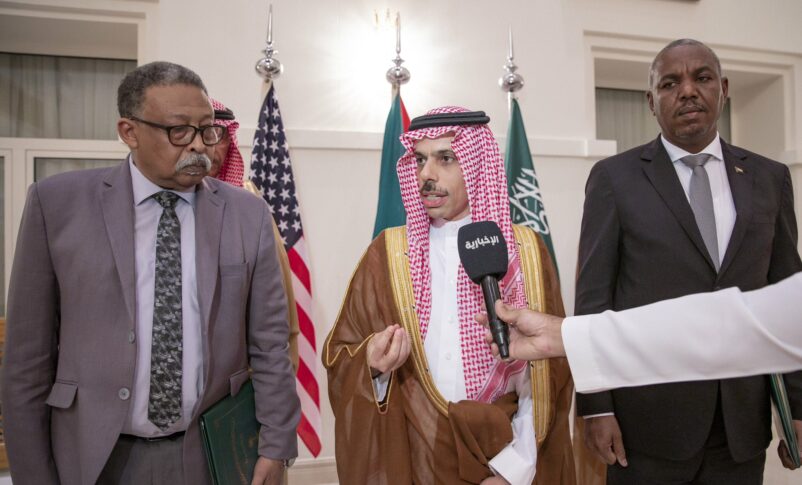Mediators suspended Sudan’s ceasefire talks Indefinitely
December 3, 2023 (KHARTOUM) – Saudi, American, and African mediators have indefinitely halted negotiations between Sudan’s military and the Rapid Support Forces (RSF) due to the failure of both parties to fulfil their obligations, including implementing agreed-upon confidence-building measures and withdrawing military forces from key cities.
According to sources close to the negotiations, progress stalled when the RSF resisted the army’s demand to withdraw their forces from cities and civilian facilities and end their presence on roads and in cities. The RSF negotiators insisted on maintaining their bases and checkpoints in areas under their control in the capital, Khartoum.
Negotiations resumed in late October after the African Union and IGAD joined the Saudi-American mediation efforts. At that time, Sudanese military leaders announced their willingness to return to the negotiating table pointing out that the RSF showed flexibility to withdraw from cities.
On November 7, the two parties agreed on measures to facilitate humanitarian aid access to civilians and to form a joint mechanism headed by the United Nations. Additionally, they agreed to implement confidence-building measures, including arresting leaders of the former regime who had escaped from prison. However, they failed to reach a ceasefire agreement, which is crucial for enforcing the humanitarian deal.
The joint mediation has not announced the suspension of the talks or provided any explanation for their decision. Meanwhile, sources within the RSF told Sudan Tribune that the mediation suspended negotiations after the military backtracked on agreements reached in November.
“The army delegation committed to implementing confidence-building measures, and a ten-day period was set to arrest the wanted individuals,” a source said. “On the second day after the signing, the RSF delegation handed over a list of names of individuals wanted for arrest.”
The sources added that the army delegation requested an additional period to fulfil its commitments, but ultimately failed to do so.
Following the signing of the November 7th agreement, the Rapid Support Forces (RSF) advertised the military’s consent to apprehend the former regime’s leaders, asserting their role in the struggle for democratic restoration in Sudan.
Regarding the humanitarian aspect, sources said that the army negotiators refused to allow humanitarian aid to enter affected areas in Darfur, Khartoum, Kordofan, and the White Nile. They also objected to the opening of Nyala, El Geneina, and El Fasher airports for humanitarian purposes and insisted on delivering aid through Port Sudan airport only.
Since mid-April, the Sudanese army and the RSF have been engaged in clashes that a series of truces have not been able to stop. According to the United Nations, the fighting has left thousands dead and millions displaced and refugees.
On November 22, Martin Griffiths, the UN relief chief, expressed grave concern about the protracted conflict in Sudan, emphasizing the devastating impact on civilians in Darfur and the continued lack of humanitarian access to Khartoum.
“The fighting must end. All parties must respect their commitments made at the Jeddah talks,” Griffiths urged.
(ST)

